Entrepreneurship Report: Ventures, Typologies, and UK Economy Analysis
VerifiedAdded on 2020/07/22
|20
|5125
|297
Report
AI Summary
This report provides a comprehensive overview of entrepreneurship, focusing on its various aspects within the context of the United Kingdom. It begins by defining entrepreneurship and then delves into different types of entrepreneurial ventures, such as small businesses, scalable start-ups, large organizations, and social enterprises. The report analyzes the relationship between these ventures and different entrepreneurial typologies, including serial, social, and female entrepreneurs. It further examines the similarities and differences among these venture types. The report then assesses the impact of small and micro ventures on the UK economy, supported by statistical data. Finally, it investigates the traits, characteristics, and skills of successful entrepreneurs and considers their background and experience. The report incorporates tables with relevant data to support its analysis, providing a well-rounded understanding of the subject.

Entrepreneurship
Paraphrase This Document
Need a fresh take? Get an instant paraphrase of this document with our AI Paraphraser
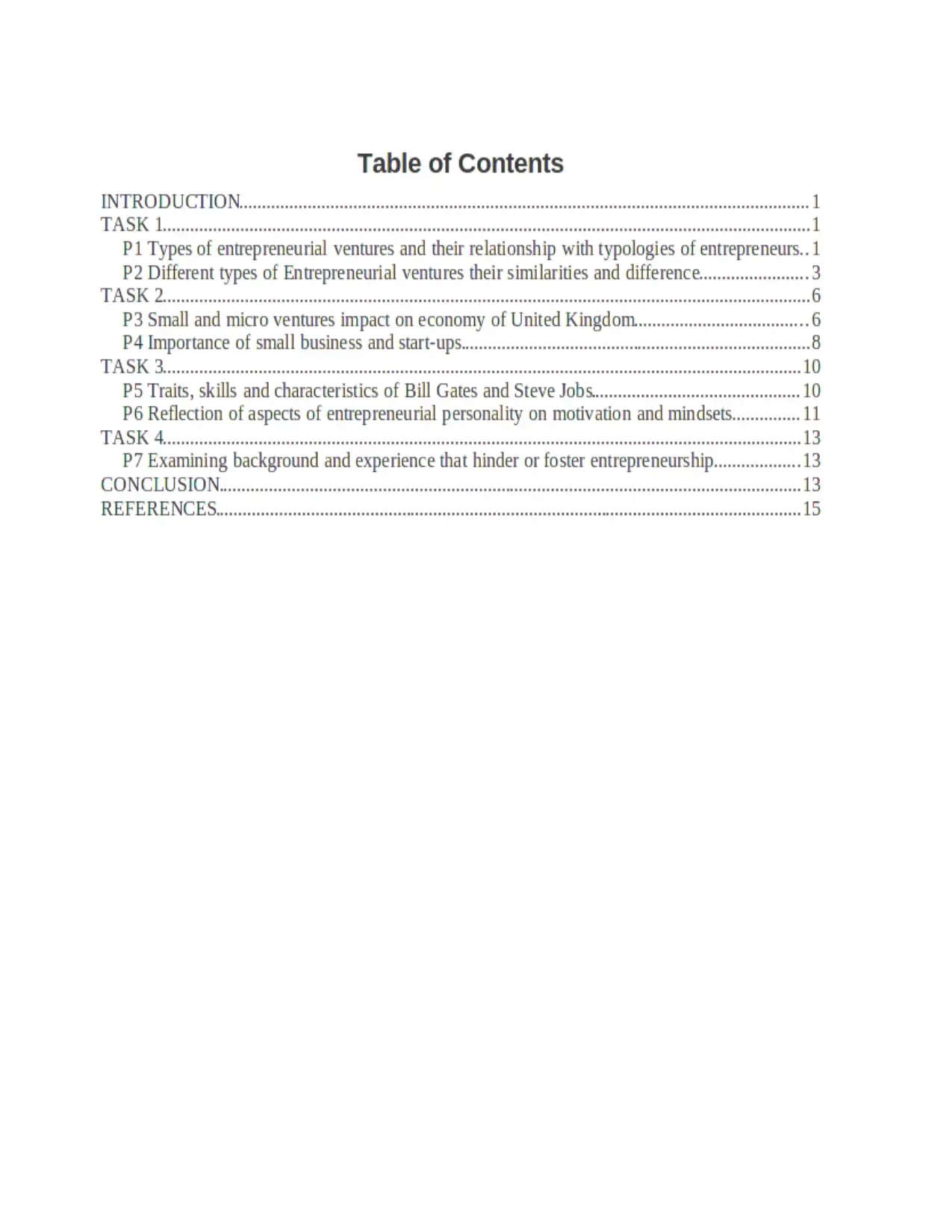

Index of Tables
Table 1: Total Enterprises in UK 2015-2016...................................................................................7
Table 2: Total Employment in UK..................................................................................................7
Table 3: Gross Value Added 2015-2016.........................................................................................7
Table 4: Gross Annual Turnover 2016............................................................................................8
Table 1: Total Enterprises in UK 2015-2016...................................................................................7
Table 2: Total Employment in UK..................................................................................................7
Table 3: Gross Value Added 2015-2016.........................................................................................7
Table 4: Gross Annual Turnover 2016............................................................................................8
⊘ This is a preview!⊘
Do you want full access?
Subscribe today to unlock all pages.

Trusted by 1+ million students worldwide
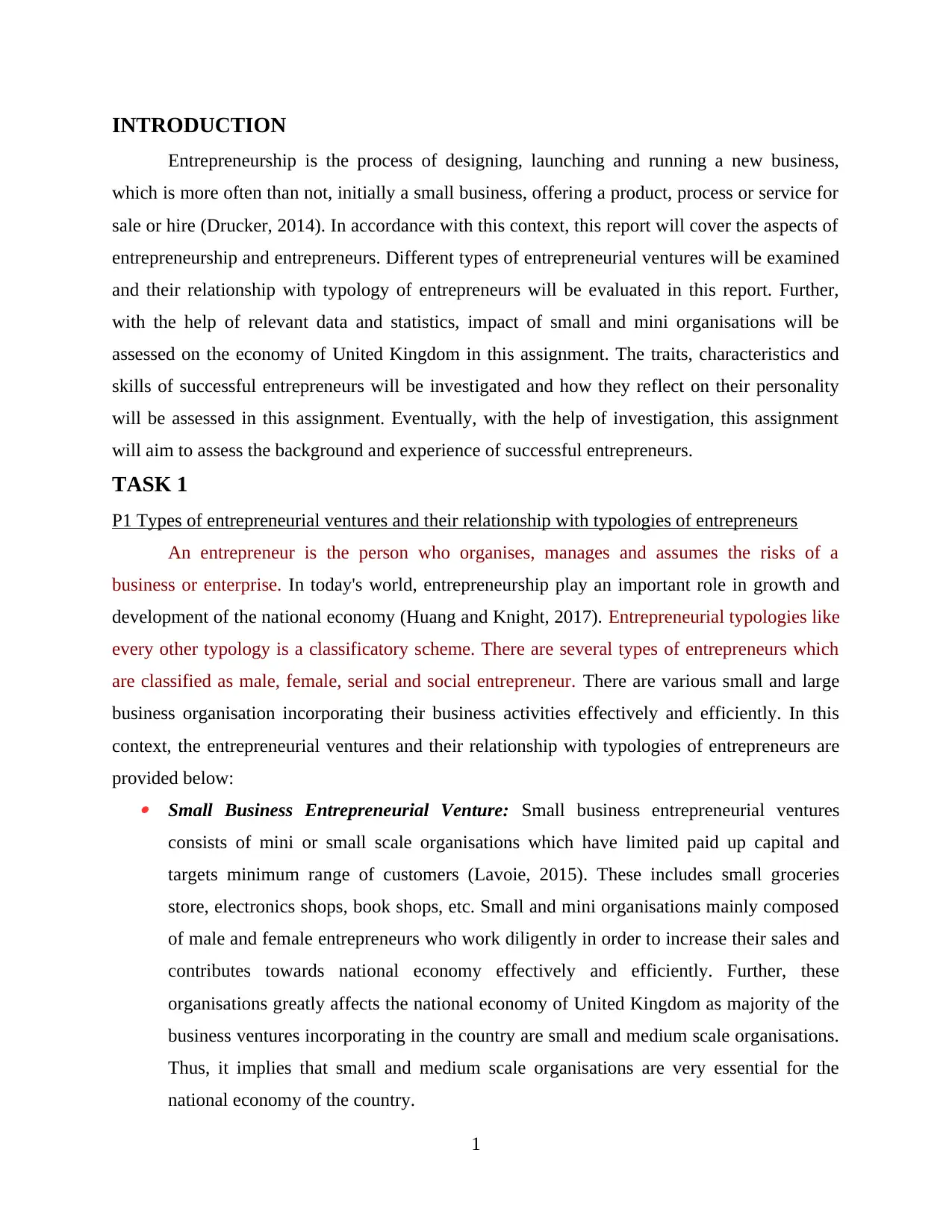
INTRODUCTION
Entrepreneurship is the process of designing, launching and running a new business,
which is more often than not, initially a small business, offering a product, process or service for
sale or hire (Drucker, 2014). In accordance with this context, this report will cover the aspects of
entrepreneurship and entrepreneurs. Different types of entrepreneurial ventures will be examined
and their relationship with typology of entrepreneurs will be evaluated in this report. Further,
with the help of relevant data and statistics, impact of small and mini organisations will be
assessed on the economy of United Kingdom in this assignment. The traits, characteristics and
skills of successful entrepreneurs will be investigated and how they reflect on their personality
will be assessed in this assignment. Eventually, with the help of investigation, this assignment
will aim to assess the background and experience of successful entrepreneurs.
TASK 1
P1 Types of entrepreneurial ventures and their relationship with typologies of entrepreneurs
An entrepreneur is the person who organises, manages and assumes the risks of a
business or enterprise. In today's world, entrepreneurship play an important role in growth and
development of the national economy (Huang and Knight, 2017). Entrepreneurial typologies like
every other typology is a classificatory scheme. There are several types of entrepreneurs which
are classified as male, female, serial and social entrepreneur. There are various small and large
business organisation incorporating their business activities effectively and efficiently. In this
context, the entrepreneurial ventures and their relationship with typologies of entrepreneurs are
provided below: Small Business Entrepreneurial Venture: Small business entrepreneurial ventures
consists of mini or small scale organisations which have limited paid up capital and
targets minimum range of customers (Lavoie, 2015). These includes small groceries
store, electronics shops, book shops, etc. Small and mini organisations mainly composed
of male and female entrepreneurs who work diligently in order to increase their sales and
contributes towards national economy effectively and efficiently. Further, these
organisations greatly affects the national economy of United Kingdom as majority of the
business ventures incorporating in the country are small and medium scale organisations.
Thus, it implies that small and medium scale organisations are very essential for the
national economy of the country.
1
Entrepreneurship is the process of designing, launching and running a new business,
which is more often than not, initially a small business, offering a product, process or service for
sale or hire (Drucker, 2014). In accordance with this context, this report will cover the aspects of
entrepreneurship and entrepreneurs. Different types of entrepreneurial ventures will be examined
and their relationship with typology of entrepreneurs will be evaluated in this report. Further,
with the help of relevant data and statistics, impact of small and mini organisations will be
assessed on the economy of United Kingdom in this assignment. The traits, characteristics and
skills of successful entrepreneurs will be investigated and how they reflect on their personality
will be assessed in this assignment. Eventually, with the help of investigation, this assignment
will aim to assess the background and experience of successful entrepreneurs.
TASK 1
P1 Types of entrepreneurial ventures and their relationship with typologies of entrepreneurs
An entrepreneur is the person who organises, manages and assumes the risks of a
business or enterprise. In today's world, entrepreneurship play an important role in growth and
development of the national economy (Huang and Knight, 2017). Entrepreneurial typologies like
every other typology is a classificatory scheme. There are several types of entrepreneurs which
are classified as male, female, serial and social entrepreneur. There are various small and large
business organisation incorporating their business activities effectively and efficiently. In this
context, the entrepreneurial ventures and their relationship with typologies of entrepreneurs are
provided below: Small Business Entrepreneurial Venture: Small business entrepreneurial ventures
consists of mini or small scale organisations which have limited paid up capital and
targets minimum range of customers (Lavoie, 2015). These includes small groceries
store, electronics shops, book shops, etc. Small and mini organisations mainly composed
of male and female entrepreneurs who work diligently in order to increase their sales and
contributes towards national economy effectively and efficiently. Further, these
organisations greatly affects the national economy of United Kingdom as majority of the
business ventures incorporating in the country are small and medium scale organisations.
Thus, it implies that small and medium scale organisations are very essential for the
national economy of the country.
1
Paraphrase This Document
Need a fresh take? Get an instant paraphrase of this document with our AI Paraphraser
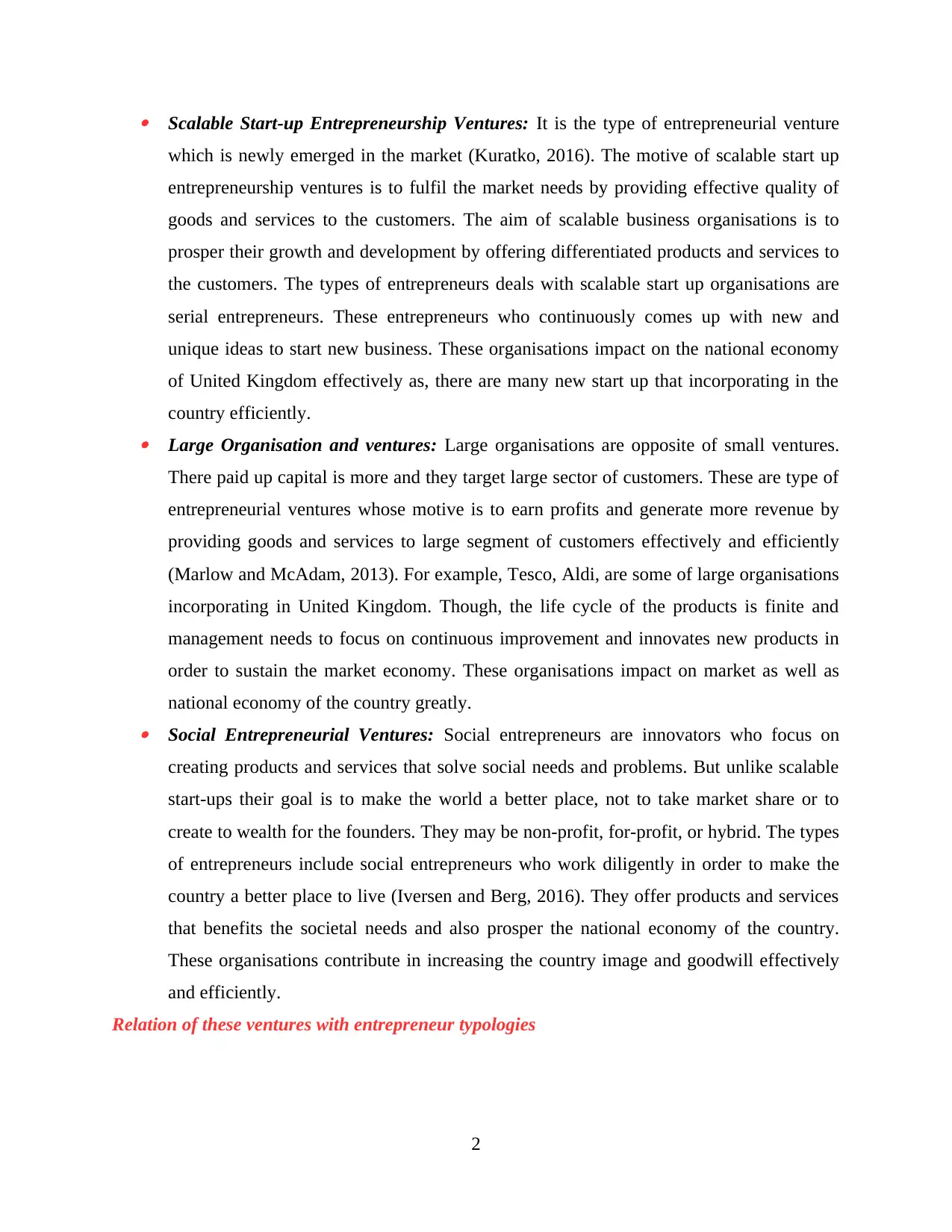
Scalable Start-up Entrepreneurship Ventures: It is the type of entrepreneurial venture
which is newly emerged in the market (Kuratko, 2016). The motive of scalable start up
entrepreneurship ventures is to fulfil the market needs by providing effective quality of
goods and services to the customers. The aim of scalable business organisations is to
prosper their growth and development by offering differentiated products and services to
the customers. The types of entrepreneurs deals with scalable start up organisations are
serial entrepreneurs. These entrepreneurs who continuously comes up with new and
unique ideas to start new business. These organisations impact on the national economy
of United Kingdom effectively as, there are many new start up that incorporating in the
country efficiently. Large Organisation and ventures: Large organisations are opposite of small ventures.
There paid up capital is more and they target large sector of customers. These are type of
entrepreneurial ventures whose motive is to earn profits and generate more revenue by
providing goods and services to large segment of customers effectively and efficiently
(Marlow and McAdam, 2013). For example, Tesco, Aldi, are some of large organisations
incorporating in United Kingdom. Though, the life cycle of the products is finite and
management needs to focus on continuous improvement and innovates new products in
order to sustain the market economy. These organisations impact on market as well as
national economy of the country greatly. Social Entrepreneurial Ventures: Social entrepreneurs are innovators who focus on
creating products and services that solve social needs and problems. But unlike scalable
start-ups their goal is to make the world a better place, not to take market share or to
create to wealth for the founders. They may be non-profit, for-profit, or hybrid. The types
of entrepreneurs include social entrepreneurs who work diligently in order to make the
country a better place to live (Iversen and Berg, 2016). They offer products and services
that benefits the societal needs and also prosper the national economy of the country.
These organisations contribute in increasing the country image and goodwill effectively
and efficiently.
Relation of these ventures with entrepreneur typologies
2
which is newly emerged in the market (Kuratko, 2016). The motive of scalable start up
entrepreneurship ventures is to fulfil the market needs by providing effective quality of
goods and services to the customers. The aim of scalable business organisations is to
prosper their growth and development by offering differentiated products and services to
the customers. The types of entrepreneurs deals with scalable start up organisations are
serial entrepreneurs. These entrepreneurs who continuously comes up with new and
unique ideas to start new business. These organisations impact on the national economy
of United Kingdom effectively as, there are many new start up that incorporating in the
country efficiently. Large Organisation and ventures: Large organisations are opposite of small ventures.
There paid up capital is more and they target large sector of customers. These are type of
entrepreneurial ventures whose motive is to earn profits and generate more revenue by
providing goods and services to large segment of customers effectively and efficiently
(Marlow and McAdam, 2013). For example, Tesco, Aldi, are some of large organisations
incorporating in United Kingdom. Though, the life cycle of the products is finite and
management needs to focus on continuous improvement and innovates new products in
order to sustain the market economy. These organisations impact on market as well as
national economy of the country greatly. Social Entrepreneurial Ventures: Social entrepreneurs are innovators who focus on
creating products and services that solve social needs and problems. But unlike scalable
start-ups their goal is to make the world a better place, not to take market share or to
create to wealth for the founders. They may be non-profit, for-profit, or hybrid. The types
of entrepreneurs include social entrepreneurs who work diligently in order to make the
country a better place to live (Iversen and Berg, 2016). They offer products and services
that benefits the societal needs and also prosper the national economy of the country.
These organisations contribute in increasing the country image and goodwill effectively
and efficiently.
Relation of these ventures with entrepreneur typologies
2
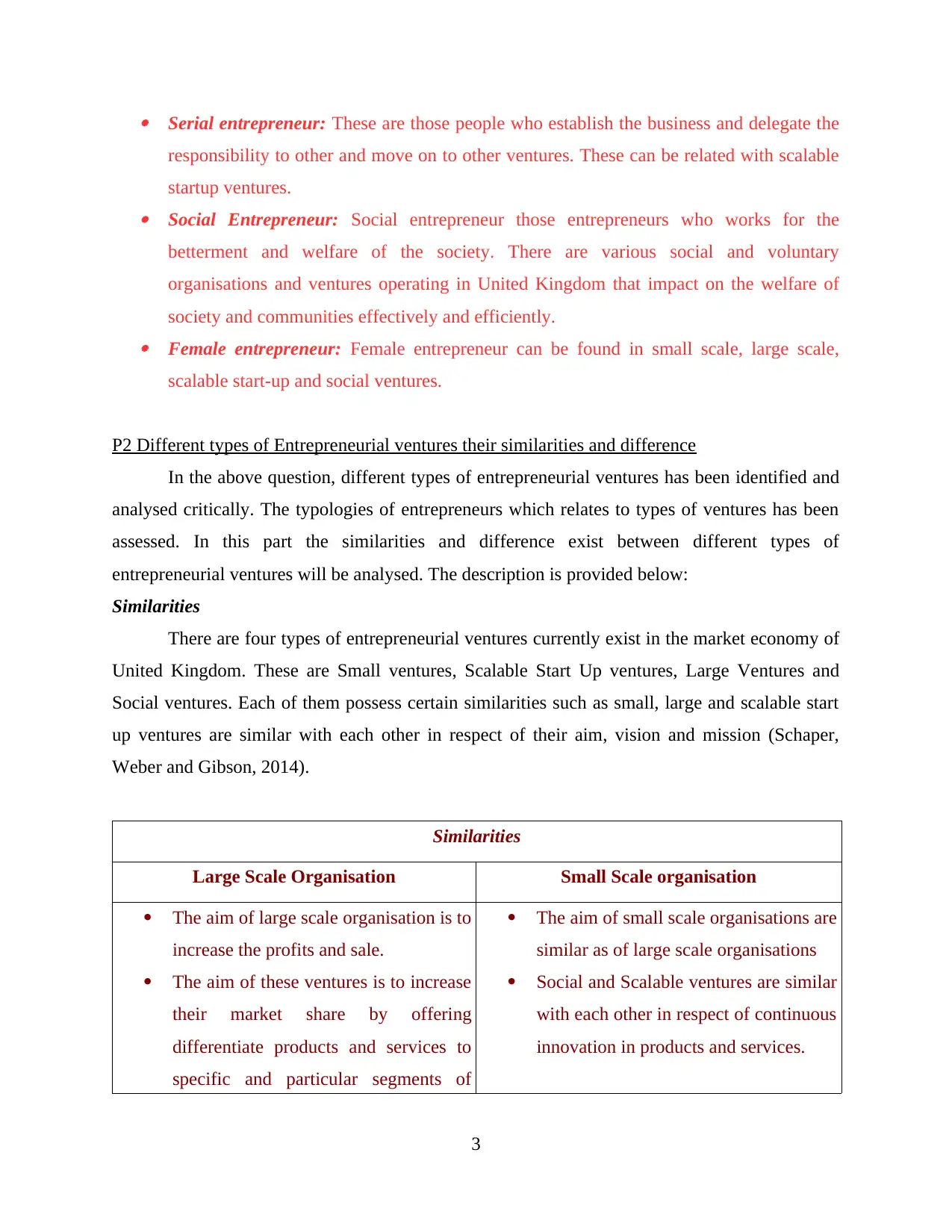
Serial entrepreneur: These are those people who establish the business and delegate the
responsibility to other and move on to other ventures. These can be related with scalable
startup ventures. Social Entrepreneur: Social entrepreneur those entrepreneurs who works for the
betterment and welfare of the society. There are various social and voluntary
organisations and ventures operating in United Kingdom that impact on the welfare of
society and communities effectively and efficiently. Female entrepreneur: Female entrepreneur can be found in small scale, large scale,
scalable start-up and social ventures.
P2 Different types of Entrepreneurial ventures their similarities and difference
In the above question, different types of entrepreneurial ventures has been identified and
analysed critically. The typologies of entrepreneurs which relates to types of ventures has been
assessed. In this part the similarities and difference exist between different types of
entrepreneurial ventures will be analysed. The description is provided below:
Similarities
There are four types of entrepreneurial ventures currently exist in the market economy of
United Kingdom. These are Small ventures, Scalable Start Up ventures, Large Ventures and
Social ventures. Each of them possess certain similarities such as small, large and scalable start
up ventures are similar with each other in respect of their aim, vision and mission (Schaper,
Weber and Gibson, 2014).
Similarities
Large Scale Organisation Small Scale organisation
The aim of large scale organisation is to
increase the profits and sale.
The aim of these ventures is to increase
their market share by offering
differentiate products and services to
specific and particular segments of
The aim of small scale organisations are
similar as of large scale organisations
Social and Scalable ventures are similar
with each other in respect of continuous
innovation in products and services.
3
responsibility to other and move on to other ventures. These can be related with scalable
startup ventures. Social Entrepreneur: Social entrepreneur those entrepreneurs who works for the
betterment and welfare of the society. There are various social and voluntary
organisations and ventures operating in United Kingdom that impact on the welfare of
society and communities effectively and efficiently. Female entrepreneur: Female entrepreneur can be found in small scale, large scale,
scalable start-up and social ventures.
P2 Different types of Entrepreneurial ventures their similarities and difference
In the above question, different types of entrepreneurial ventures has been identified and
analysed critically. The typologies of entrepreneurs which relates to types of ventures has been
assessed. In this part the similarities and difference exist between different types of
entrepreneurial ventures will be analysed. The description is provided below:
Similarities
There are four types of entrepreneurial ventures currently exist in the market economy of
United Kingdom. These are Small ventures, Scalable Start Up ventures, Large Ventures and
Social ventures. Each of them possess certain similarities such as small, large and scalable start
up ventures are similar with each other in respect of their aim, vision and mission (Schaper,
Weber and Gibson, 2014).
Similarities
Large Scale Organisation Small Scale organisation
The aim of large scale organisation is to
increase the profits and sale.
The aim of these ventures is to increase
their market share by offering
differentiate products and services to
specific and particular segments of
The aim of small scale organisations are
similar as of large scale organisations
Social and Scalable ventures are similar
with each other in respect of continuous
innovation in products and services.
3
⊘ This is a preview!⊘
Do you want full access?
Subscribe today to unlock all pages.

Trusted by 1+ million students worldwide
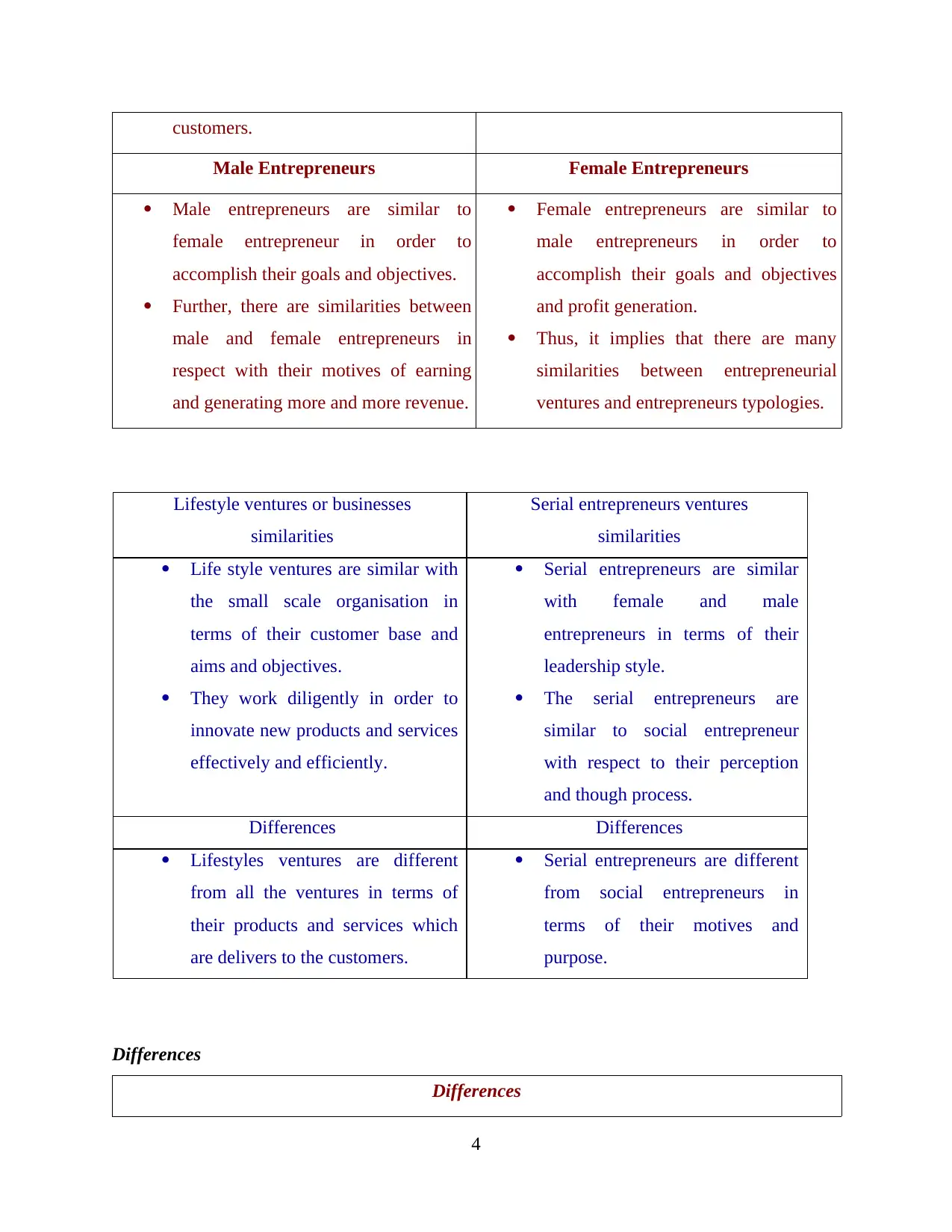
customers.
Male Entrepreneurs Female Entrepreneurs
Male entrepreneurs are similar to
female entrepreneur in order to
accomplish their goals and objectives.
Further, there are similarities between
male and female entrepreneurs in
respect with their motives of earning
and generating more and more revenue.
Female entrepreneurs are similar to
male entrepreneurs in order to
accomplish their goals and objectives
and profit generation.
Thus, it implies that there are many
similarities between entrepreneurial
ventures and entrepreneurs typologies.
Lifestyle ventures or businesses
similarities
Serial entrepreneurs ventures
similarities
Life style ventures are similar with
the small scale organisation in
terms of their customer base and
aims and objectives.
They work diligently in order to
innovate new products and services
effectively and efficiently.
Serial entrepreneurs are similar
with female and male
entrepreneurs in terms of their
leadership style.
The serial entrepreneurs are
similar to social entrepreneur
with respect to their perception
and though process.
Differences Differences
Lifestyles ventures are different
from all the ventures in terms of
their products and services which
are delivers to the customers.
Serial entrepreneurs are different
from social entrepreneurs in
terms of their motives and
purpose.
Differences
Differences
4
Male Entrepreneurs Female Entrepreneurs
Male entrepreneurs are similar to
female entrepreneur in order to
accomplish their goals and objectives.
Further, there are similarities between
male and female entrepreneurs in
respect with their motives of earning
and generating more and more revenue.
Female entrepreneurs are similar to
male entrepreneurs in order to
accomplish their goals and objectives
and profit generation.
Thus, it implies that there are many
similarities between entrepreneurial
ventures and entrepreneurs typologies.
Lifestyle ventures or businesses
similarities
Serial entrepreneurs ventures
similarities
Life style ventures are similar with
the small scale organisation in
terms of their customer base and
aims and objectives.
They work diligently in order to
innovate new products and services
effectively and efficiently.
Serial entrepreneurs are similar
with female and male
entrepreneurs in terms of their
leadership style.
The serial entrepreneurs are
similar to social entrepreneur
with respect to their perception
and though process.
Differences Differences
Lifestyles ventures are different
from all the ventures in terms of
their products and services which
are delivers to the customers.
Serial entrepreneurs are different
from social entrepreneurs in
terms of their motives and
purpose.
Differences
Differences
4
Paraphrase This Document
Need a fresh take? Get an instant paraphrase of this document with our AI Paraphraser
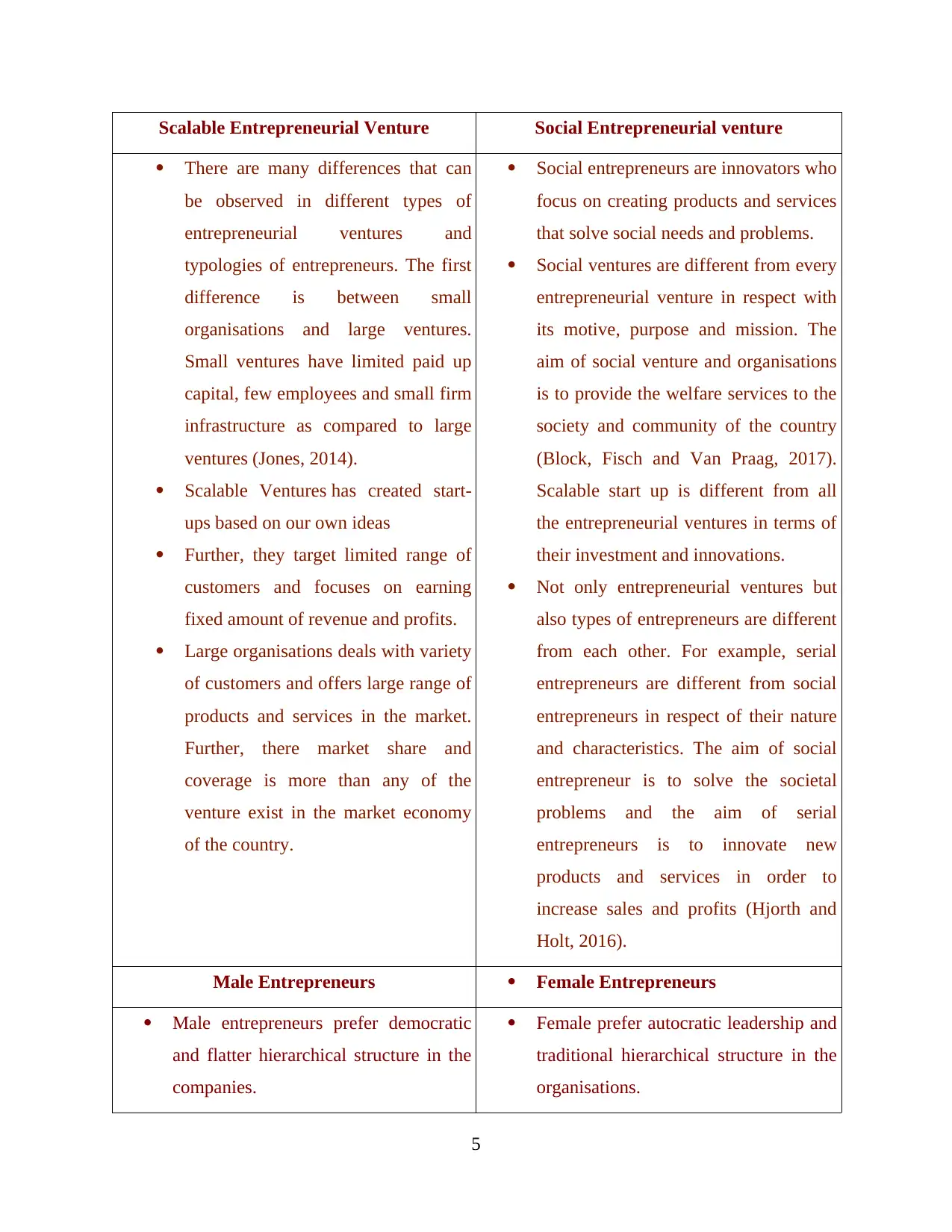
Scalable Entrepreneurial Venture Social Entrepreneurial venture
There are many differences that can
be observed in different types of
entrepreneurial ventures and
typologies of entrepreneurs. The first
difference is between small
organisations and large ventures.
Small ventures have limited paid up
capital, few employees and small firm
infrastructure as compared to large
ventures (Jones, 2014).
Scalable Ventures has created start-
ups based on our own ideas
Further, they target limited range of
customers and focuses on earning
fixed amount of revenue and profits.
Large organisations deals with variety
of customers and offers large range of
products and services in the market.
Further, there market share and
coverage is more than any of the
venture exist in the market economy
of the country.
Social entrepreneurs are innovators who
focus on creating products and services
that solve social needs and problems.
Social ventures are different from every
entrepreneurial venture in respect with
its motive, purpose and mission. The
aim of social venture and organisations
is to provide the welfare services to the
society and community of the country
(Block, Fisch and Van Praag, 2017).
Scalable start up is different from all
the entrepreneurial ventures in terms of
their investment and innovations.
Not only entrepreneurial ventures but
also types of entrepreneurs are different
from each other. For example, serial
entrepreneurs are different from social
entrepreneurs in respect of their nature
and characteristics. The aim of social
entrepreneur is to solve the societal
problems and the aim of serial
entrepreneurs is to innovate new
products and services in order to
increase sales and profits (Hjorth and
Holt, 2016).
Male Entrepreneurs Female Entrepreneurs
Male entrepreneurs prefer democratic
and flatter hierarchical structure in the
companies.
Female prefer autocratic leadership and
traditional hierarchical structure in the
organisations.
5
There are many differences that can
be observed in different types of
entrepreneurial ventures and
typologies of entrepreneurs. The first
difference is between small
organisations and large ventures.
Small ventures have limited paid up
capital, few employees and small firm
infrastructure as compared to large
ventures (Jones, 2014).
Scalable Ventures has created start-
ups based on our own ideas
Further, they target limited range of
customers and focuses on earning
fixed amount of revenue and profits.
Large organisations deals with variety
of customers and offers large range of
products and services in the market.
Further, there market share and
coverage is more than any of the
venture exist in the market economy
of the country.
Social entrepreneurs are innovators who
focus on creating products and services
that solve social needs and problems.
Social ventures are different from every
entrepreneurial venture in respect with
its motive, purpose and mission. The
aim of social venture and organisations
is to provide the welfare services to the
society and community of the country
(Block, Fisch and Van Praag, 2017).
Scalable start up is different from all
the entrepreneurial ventures in terms of
their investment and innovations.
Not only entrepreneurial ventures but
also types of entrepreneurs are different
from each other. For example, serial
entrepreneurs are different from social
entrepreneurs in respect of their nature
and characteristics. The aim of social
entrepreneur is to solve the societal
problems and the aim of serial
entrepreneurs is to innovate new
products and services in order to
increase sales and profits (Hjorth and
Holt, 2016).
Male Entrepreneurs Female Entrepreneurs
Male entrepreneurs prefer democratic
and flatter hierarchical structure in the
companies.
Female prefer autocratic leadership and
traditional hierarchical structure in the
organisations.
5
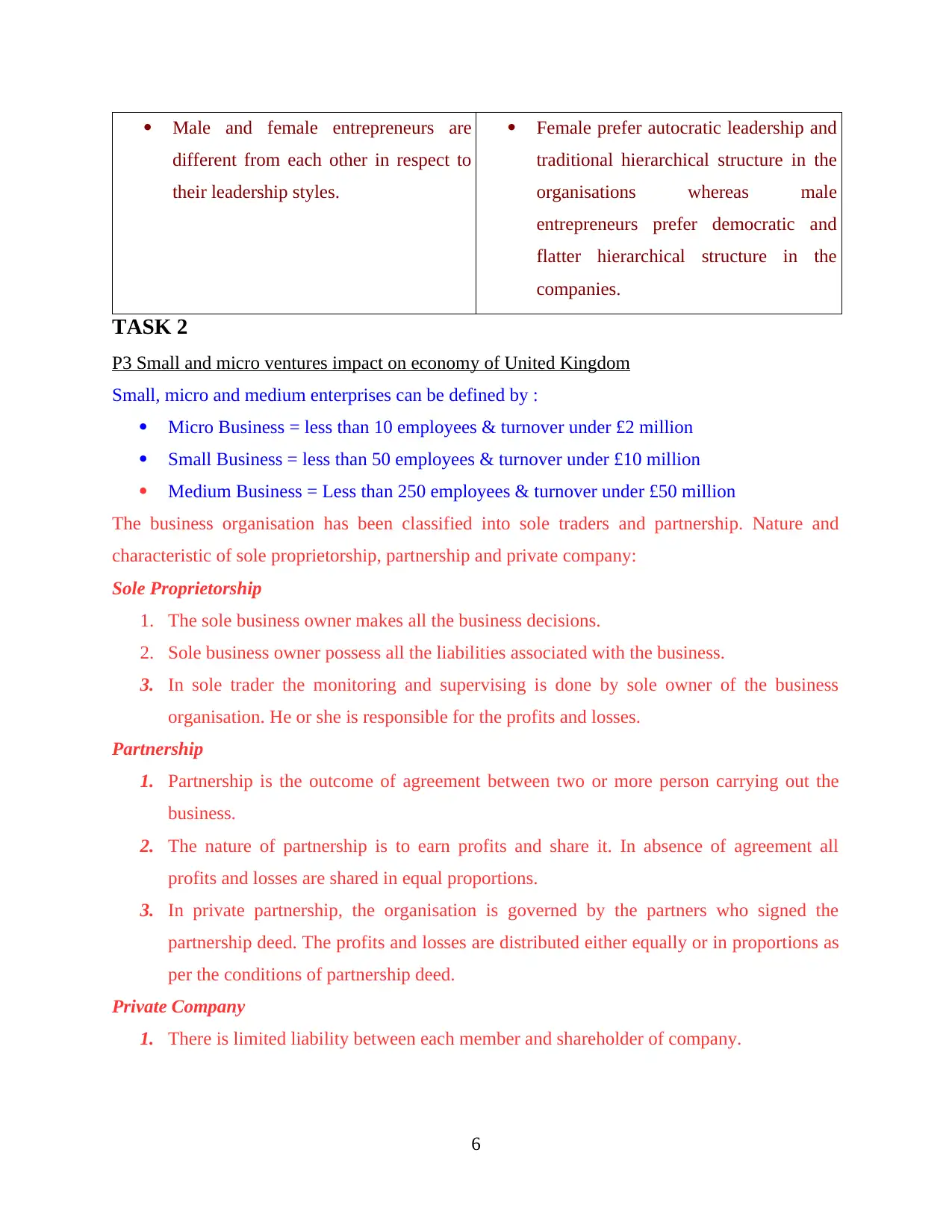
Male and female entrepreneurs are
different from each other in respect to
their leadership styles.
Female prefer autocratic leadership and
traditional hierarchical structure in the
organisations whereas male
entrepreneurs prefer democratic and
flatter hierarchical structure in the
companies.
TASK 2
P3 Small and micro ventures impact on economy of United Kingdom
Small, micro and medium enterprises can be defined by :
Micro Business = less than 10 employees & turnover under £2 million
Small Business = less than 50 employees & turnover under £10 million
Medium Business = Less than 250 employees & turnover under £50 million
The business organisation has been classified into sole traders and partnership. Nature and
characteristic of sole proprietorship, partnership and private company:
Sole Proprietorship
1. The sole business owner makes all the business decisions.
2. Sole business owner possess all the liabilities associated with the business.
3. In sole trader the monitoring and supervising is done by sole owner of the business
organisation. He or she is responsible for the profits and losses.
Partnership
1. Partnership is the outcome of agreement between two or more person carrying out the
business.
2. The nature of partnership is to earn profits and share it. In absence of agreement all
profits and losses are shared in equal proportions.
3. In private partnership, the organisation is governed by the partners who signed the
partnership deed. The profits and losses are distributed either equally or in proportions as
per the conditions of partnership deed.
Private Company
1. There is limited liability between each member and shareholder of company.
6
different from each other in respect to
their leadership styles.
Female prefer autocratic leadership and
traditional hierarchical structure in the
organisations whereas male
entrepreneurs prefer democratic and
flatter hierarchical structure in the
companies.
TASK 2
P3 Small and micro ventures impact on economy of United Kingdom
Small, micro and medium enterprises can be defined by :
Micro Business = less than 10 employees & turnover under £2 million
Small Business = less than 50 employees & turnover under £10 million
Medium Business = Less than 250 employees & turnover under £50 million
The business organisation has been classified into sole traders and partnership. Nature and
characteristic of sole proprietorship, partnership and private company:
Sole Proprietorship
1. The sole business owner makes all the business decisions.
2. Sole business owner possess all the liabilities associated with the business.
3. In sole trader the monitoring and supervising is done by sole owner of the business
organisation. He or she is responsible for the profits and losses.
Partnership
1. Partnership is the outcome of agreement between two or more person carrying out the
business.
2. The nature of partnership is to earn profits and share it. In absence of agreement all
profits and losses are shared in equal proportions.
3. In private partnership, the organisation is governed by the partners who signed the
partnership deed. The profits and losses are distributed either equally or in proportions as
per the conditions of partnership deed.
Private Company
1. There is limited liability between each member and shareholder of company.
6
⊘ This is a preview!⊘
Do you want full access?
Subscribe today to unlock all pages.

Trusted by 1+ million students worldwide
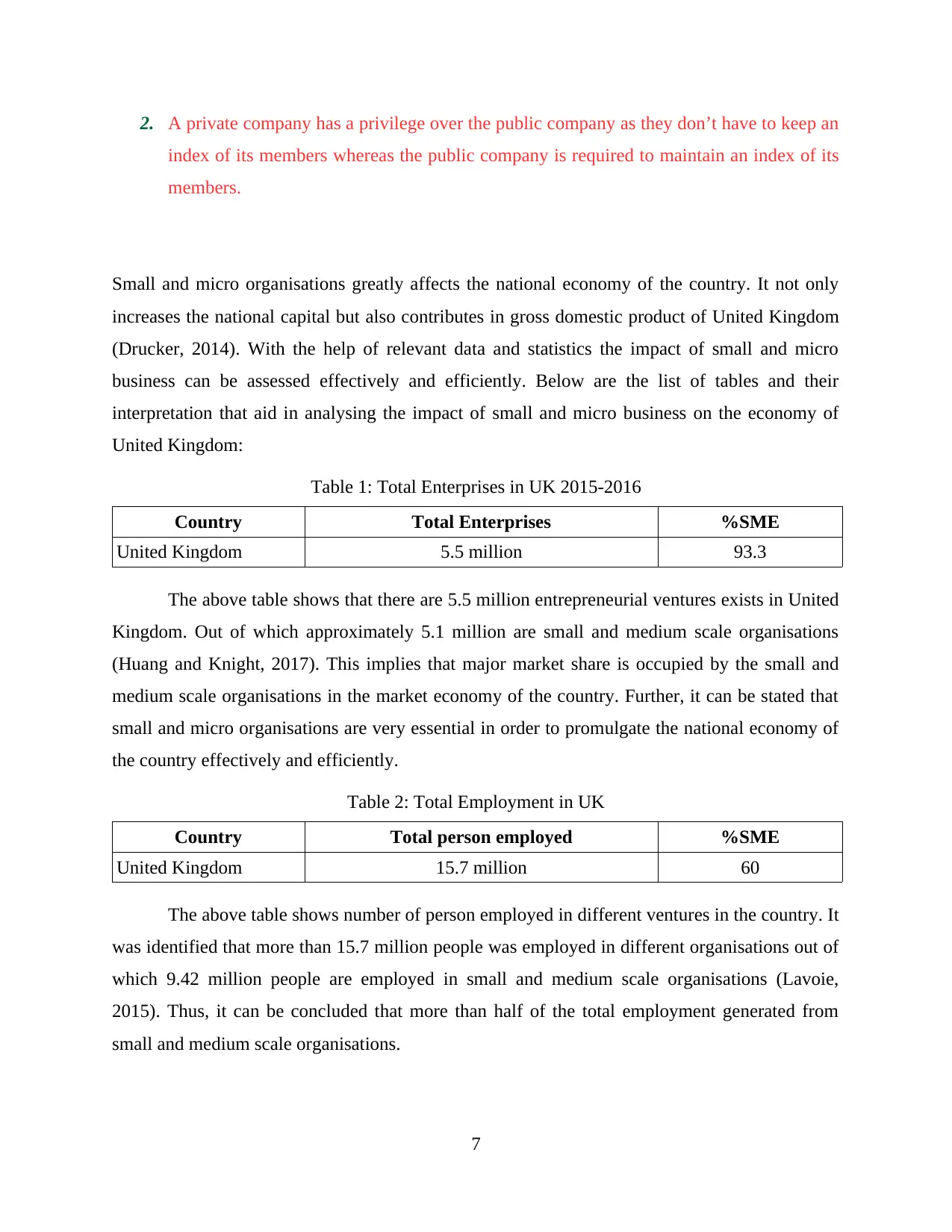
2. A private company has a privilege over the public company as they don’t have to keep an
index of its members whereas the public company is required to maintain an index of its
members.
Small and micro organisations greatly affects the national economy of the country. It not only
increases the national capital but also contributes in gross domestic product of United Kingdom
(Drucker, 2014). With the help of relevant data and statistics the impact of small and micro
business can be assessed effectively and efficiently. Below are the list of tables and their
interpretation that aid in analysing the impact of small and micro business on the economy of
United Kingdom:
Table 1: Total Enterprises in UK 2015-2016
Country Total Enterprises %SME
United Kingdom 5.5 million 93.3
The above table shows that there are 5.5 million entrepreneurial ventures exists in United
Kingdom. Out of which approximately 5.1 million are small and medium scale organisations
(Huang and Knight, 2017). This implies that major market share is occupied by the small and
medium scale organisations in the market economy of the country. Further, it can be stated that
small and micro organisations are very essential in order to promulgate the national economy of
the country effectively and efficiently.
Table 2: Total Employment in UK
Country Total person employed %SME
United Kingdom 15.7 million 60
The above table shows number of person employed in different ventures in the country. It
was identified that more than 15.7 million people was employed in different organisations out of
which 9.42 million people are employed in small and medium scale organisations (Lavoie,
2015). Thus, it can be concluded that more than half of the total employment generated from
small and medium scale organisations.
7
index of its members whereas the public company is required to maintain an index of its
members.
Small and micro organisations greatly affects the national economy of the country. It not only
increases the national capital but also contributes in gross domestic product of United Kingdom
(Drucker, 2014). With the help of relevant data and statistics the impact of small and micro
business can be assessed effectively and efficiently. Below are the list of tables and their
interpretation that aid in analysing the impact of small and micro business on the economy of
United Kingdom:
Table 1: Total Enterprises in UK 2015-2016
Country Total Enterprises %SME
United Kingdom 5.5 million 93.3
The above table shows that there are 5.5 million entrepreneurial ventures exists in United
Kingdom. Out of which approximately 5.1 million are small and medium scale organisations
(Huang and Knight, 2017). This implies that major market share is occupied by the small and
medium scale organisations in the market economy of the country. Further, it can be stated that
small and micro organisations are very essential in order to promulgate the national economy of
the country effectively and efficiently.
Table 2: Total Employment in UK
Country Total person employed %SME
United Kingdom 15.7 million 60
The above table shows number of person employed in different ventures in the country. It
was identified that more than 15.7 million people was employed in different organisations out of
which 9.42 million people are employed in small and medium scale organisations (Lavoie,
2015). Thus, it can be concluded that more than half of the total employment generated from
small and medium scale organisations.
7
Paraphrase This Document
Need a fresh take? Get an instant paraphrase of this document with our AI Paraphraser
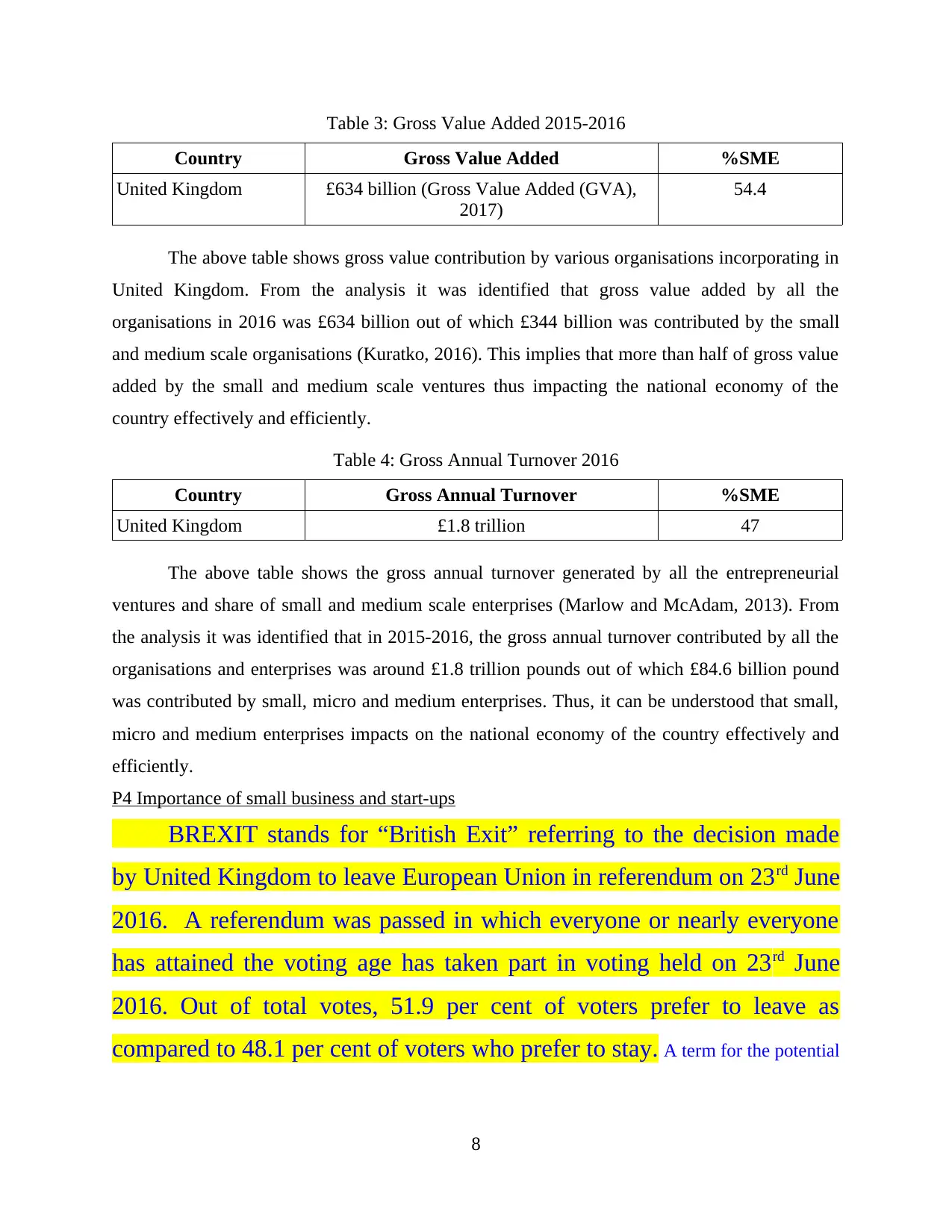
Table 3: Gross Value Added 2015-2016
Country Gross Value Added %SME
United Kingdom £634 billion (Gross Value Added (GVA),
2017)
54.4
The above table shows gross value contribution by various organisations incorporating in
United Kingdom. From the analysis it was identified that gross value added by all the
organisations in 2016 was £634 billion out of which £344 billion was contributed by the small
and medium scale organisations (Kuratko, 2016). This implies that more than half of gross value
added by the small and medium scale ventures thus impacting the national economy of the
country effectively and efficiently.
Table 4: Gross Annual Turnover 2016
Country Gross Annual Turnover %SME
United Kingdom £1.8 trillion 47
The above table shows the gross annual turnover generated by all the entrepreneurial
ventures and share of small and medium scale enterprises (Marlow and McAdam, 2013). From
the analysis it was identified that in 2015-2016, the gross annual turnover contributed by all the
organisations and enterprises was around £1.8 trillion pounds out of which £84.6 billion pound
was contributed by small, micro and medium enterprises. Thus, it can be understood that small,
micro and medium enterprises impacts on the national economy of the country effectively and
efficiently.
P4 Importance of small business and start-ups
BREXIT stands for “British Exit” referring to the decision made
by United Kingdom to leave European Union in referendum on 23rd June
2016. A referendum was passed in which everyone or nearly everyone
has attained the voting age has taken part in voting held on 23rd June
2016. Out of total votes, 51.9 per cent of voters prefer to leave as
compared to 48.1 per cent of voters who prefer to stay. A term for the potential
8
Country Gross Value Added %SME
United Kingdom £634 billion (Gross Value Added (GVA),
2017)
54.4
The above table shows gross value contribution by various organisations incorporating in
United Kingdom. From the analysis it was identified that gross value added by all the
organisations in 2016 was £634 billion out of which £344 billion was contributed by the small
and medium scale organisations (Kuratko, 2016). This implies that more than half of gross value
added by the small and medium scale ventures thus impacting the national economy of the
country effectively and efficiently.
Table 4: Gross Annual Turnover 2016
Country Gross Annual Turnover %SME
United Kingdom £1.8 trillion 47
The above table shows the gross annual turnover generated by all the entrepreneurial
ventures and share of small and medium scale enterprises (Marlow and McAdam, 2013). From
the analysis it was identified that in 2015-2016, the gross annual turnover contributed by all the
organisations and enterprises was around £1.8 trillion pounds out of which £84.6 billion pound
was contributed by small, micro and medium enterprises. Thus, it can be understood that small,
micro and medium enterprises impacts on the national economy of the country effectively and
efficiently.
P4 Importance of small business and start-ups
BREXIT stands for “British Exit” referring to the decision made
by United Kingdom to leave European Union in referendum on 23rd June
2016. A referendum was passed in which everyone or nearly everyone
has attained the voting age has taken part in voting held on 23rd June
2016. Out of total votes, 51.9 per cent of voters prefer to leave as
compared to 48.1 per cent of voters who prefer to stay. A term for the potential
8
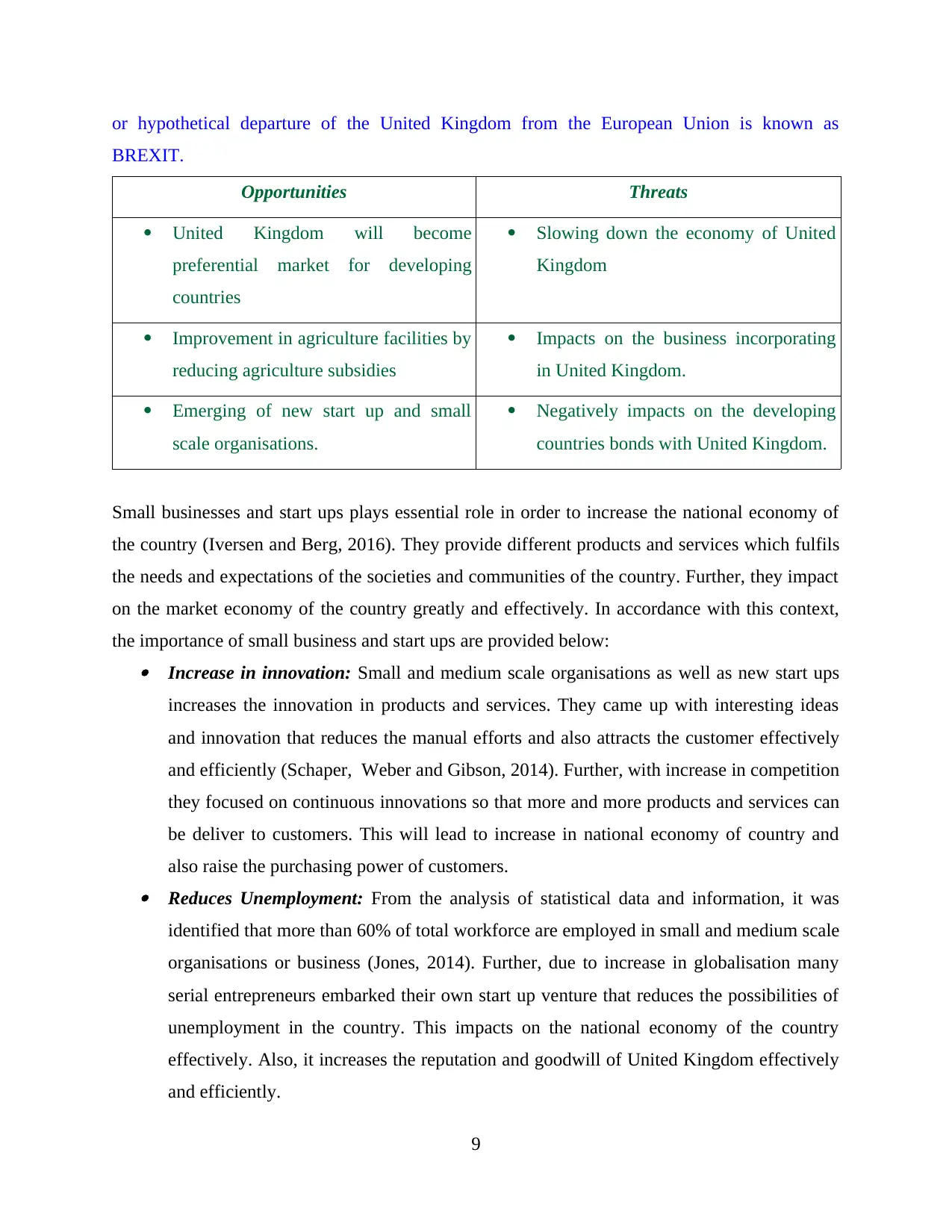
or hypothetical departure of the United Kingdom from the European Union is known as
BREXIT.
Opportunities Threats
United Kingdom will become
preferential market for developing
countries
Slowing down the economy of United
Kingdom
Improvement in agriculture facilities by
reducing agriculture subsidies
Impacts on the business incorporating
in United Kingdom.
Emerging of new start up and small
scale organisations.
Negatively impacts on the developing
countries bonds with United Kingdom.
Small businesses and start ups plays essential role in order to increase the national economy of
the country (Iversen and Berg, 2016). They provide different products and services which fulfils
the needs and expectations of the societies and communities of the country. Further, they impact
on the market economy of the country greatly and effectively. In accordance with this context,
the importance of small business and start ups are provided below: Increase in innovation: Small and medium scale organisations as well as new start ups
increases the innovation in products and services. They came up with interesting ideas
and innovation that reduces the manual efforts and also attracts the customer effectively
and efficiently (Schaper, Weber and Gibson, 2014). Further, with increase in competition
they focused on continuous innovations so that more and more products and services can
be deliver to customers. This will lead to increase in national economy of country and
also raise the purchasing power of customers. Reduces Unemployment: From the analysis of statistical data and information, it was
identified that more than 60% of total workforce are employed in small and medium scale
organisations or business (Jones, 2014). Further, due to increase in globalisation many
serial entrepreneurs embarked their own start up venture that reduces the possibilities of
unemployment in the country. This impacts on the national economy of the country
effectively. Also, it increases the reputation and goodwill of United Kingdom effectively
and efficiently.
9
BREXIT.
Opportunities Threats
United Kingdom will become
preferential market for developing
countries
Slowing down the economy of United
Kingdom
Improvement in agriculture facilities by
reducing agriculture subsidies
Impacts on the business incorporating
in United Kingdom.
Emerging of new start up and small
scale organisations.
Negatively impacts on the developing
countries bonds with United Kingdom.
Small businesses and start ups plays essential role in order to increase the national economy of
the country (Iversen and Berg, 2016). They provide different products and services which fulfils
the needs and expectations of the societies and communities of the country. Further, they impact
on the market economy of the country greatly and effectively. In accordance with this context,
the importance of small business and start ups are provided below: Increase in innovation: Small and medium scale organisations as well as new start ups
increases the innovation in products and services. They came up with interesting ideas
and innovation that reduces the manual efforts and also attracts the customer effectively
and efficiently (Schaper, Weber and Gibson, 2014). Further, with increase in competition
they focused on continuous innovations so that more and more products and services can
be deliver to customers. This will lead to increase in national economy of country and
also raise the purchasing power of customers. Reduces Unemployment: From the analysis of statistical data and information, it was
identified that more than 60% of total workforce are employed in small and medium scale
organisations or business (Jones, 2014). Further, due to increase in globalisation many
serial entrepreneurs embarked their own start up venture that reduces the possibilities of
unemployment in the country. This impacts on the national economy of the country
effectively. Also, it increases the reputation and goodwill of United Kingdom effectively
and efficiently.
9
⊘ This is a preview!⊘
Do you want full access?
Subscribe today to unlock all pages.

Trusted by 1+ million students worldwide
1 out of 20
Related Documents
Your All-in-One AI-Powered Toolkit for Academic Success.
+13062052269
info@desklib.com
Available 24*7 on WhatsApp / Email
![[object Object]](/_next/static/media/star-bottom.7253800d.svg)
Unlock your academic potential
Copyright © 2020–2026 A2Z Services. All Rights Reserved. Developed and managed by ZUCOL.





